What is web hosting?

Web hosting is a service that provides a place to websites where its files are accessible anytime, anywhere. In web hosting, you have to pay to the web hosting providers so that you can use their servers to publish your site.
Your website will be stored on special computers, and these computers are known as the server. These servers make your website accessible by people all around the world on the internet. When people want to view your website, they need to enter your website’s URL in the address bar. After submitting the website URL, then their computer will connect to your server, and then your webpages will be delivered to people who have requested for your site.
How does web hosting work?
Web hosting service providers rent out their services and technologies to the website owners so that they can host their websites on the Internet. Once your website is hosted on their server, and then any user can access your website via typing URL of your website in the address bar of their web browsers. After submitting the URL, their web browser connects to the server where your website is hosted on. The server then serves your website or requested page to your website users in their web browser.
Types of web hosting
People get confused when it comes to choosing a particular web hosting type, as there are different types of web hosting available in the market, but you have to choose as per your requirements. If you are a startup or having a new website, then it will be a good option to go for inexpensive and free web hosting, on the other hand, if your website is growing and wants more website traffic then opting for free and unlimited hosting is not going to work for you. In this situation, you should go for more reliable web hosting such as VPS or dedicated.
Let’s discuss the different types of web hosting and you can determine the type of web hosting most appropriate for your business, whether you are starting your business or want to take your business to the next level.
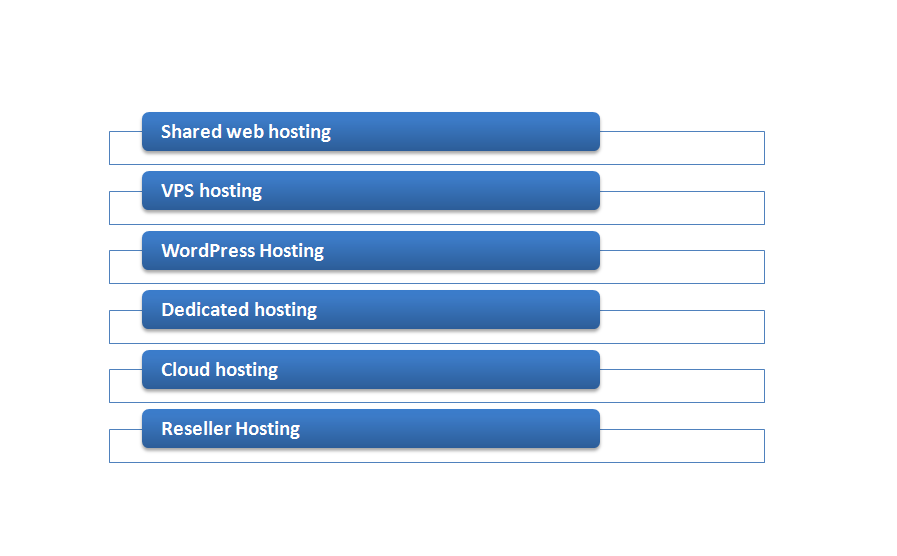
# Shared web hosting

In simple terms, shared hosting is where your website will be hosted on the server where other websites share the same server. Other websites will share all resources with each other such as RAM (Random Access Memory) and CPU. The big advantage of shared hosting is that when you share all resources with other websites, then you probably share the cost of shared hosting with others, i.e. the cost will be low as compared to other hosting plans. Therefore, choosing shared hosting is a good option for website owners who have just started their business.
In many cases, the beginners find shared hosting method easy to use as a shared hosting plan often offers various helpful tools such as website builders, and email accounts, etc.
Who should use it?
If you have a low budget, then going for shared hosting is a great option for you and you don’t require lots of technical knowledge. If you have a simple website or blogging website that don’t require high-volume of traffic, then this is the best option. If you don’t want to use lots of resources or too much on-site interaction then shared hosting will be fine.
If you already know that your website will not have more than 10,000 or 20,000 monthly website users, then you can save money by choosing a shared hosting plan.
Advantages of shared hosting
- It is one of the cost-effective types of web hosting.
- Easy to set up and use.
- No high technical knowledge required.
- A good option for beginners and small websites.
Disadvantages of shared hosting
- You have to share resources with other websites.
- If you face any performance issue then you will not have control over it.
- You have to face slower loading time and low uptime rates.
- Not scalable.
# VPS hosting

VPS is shorthand for “virtual private server” and it is a step above shared hosting. When your website grows and gets tons of traffic, then you have to upgrade your existing plan. VPS hosting is ideal for those website owners who need more control but don’t need a dedicated server.
In VPS hosting, you’ll store your website within its own space on the server, but still, your website shares physical space with other websites. But, you are sharing the server with other websites will be less in number.
You’ll share the main server with other websites, but you’ll have dedicated resources with a VPS. The main server is divided into multiple virtual servers, that’s why it is known as a virtual private server. The individual website can customize these virtual servers.
Who should use it?
If your website needs high uptime, then it is necessary to upgrade your plan if you are previously using shared hosting. VPS hosting is the best option for small or medium-sized websites which can’t afford low uptime.
A VPS can benefit you if you have enough technical knowledge and want to make custom changes to the server configuration. If your website contains large files such as images and videos, then you should consider VPS hosting.
Advantages of VPS hosting
- You’ll have dedicated server resources.
- You can make changes to your server configuration.
- Fast load time and higher uptime rate.
- It is more cost-effective as compared to a dedicated server.
Disadvantages of VPS hosting
- You have to share the main server with other websites.
- Set up is complex as compared to shared hosting.
- Still, you’ll don’t have full control.
# WordPress Hosting

As the name implies, it is a particularly good option for those who have a WordPress website. WordPress hosting also includes security features that are specially designed for the websites developed in WordPress. The reason behind the security feature is that WordPress is widely used CMS across the globe and there are higher chances of cyber-crime.
You might be noticed that web hosting providers offer two different types of WordPress hosting:
- Shared WordPress hosting
- Managed WordPress hosting
Shared WordPress hosting will work in the same manner as other shared hosting works but the only difference will be WordPress might be pre-installed.
Managed WordPress hosting offers added features such as server caching, security, and fast loading speed.
Who should use it?
WordPress hosting is for those users who have WordPress websites. You should consider this type of hosting if you want your hosting to be optimized for WordPress site.
Advantages of WordPress hosting
- Optimized for WordPress site.
- It comes with a one-click WordPress installation or WordPress pre-installed.
- Improved security for WordPress site.
Disadvantages of WordPress hosting
- You’ll have less control and it offers less flexibility.
- It might be possible that you’ll not get updates so smooth.
- In shared WordPress hosting, you have to share resources with other WordPress sites.
# Dedicated hosting

Dedicated hosting is one of the popular and expensive web hosting services. As the name suggests, you’ll have your own or dedicated server, and that server will belong to you, and you don’t need to share your server with any other website. As you know, it is expensive hosting service as compared to others but it also offers advanced and enhanced benefits.
In dedicated hosting, you won’t share your resources with others, and as a result, your site will give you high performance. As you are using dedicated hosting, you’ll have full control over server settings, and you can choose software, configuration, etc. as you need.
Having a dedicated server, you’ll get extremely high uptime rates and fast loading speed. With this, you don’t need to worry about other websites who have high traffic that they would impact your site’s performance, i.e. your site’s performance would not be affected by others.
Who should use it?
Dedicated hosting is best suited for enterprise-level websites or who have a high volume of traffic on their website. It is recommended to use dedicated hosting if your website is having up to 100,000 monthly website users. Large e-commerce websites and enterprise-level websites should consider dedicated hosting because they can have full control over their servers.
Websites who require high-level of security should choose dedicated hosting, the website might store sensitive data such as financial data or medical record.
You can choose a web hosting provider who will manage your server for you, or if you have enough technical knowledge and can manage the server on your own then you can also do it. But if you are managing your server on your own, then you’ll be responsible for installing new updates and monitor system for any error.
If you have high-budget, only then go for dedicated hosting because sometimes it happens when dedicated hosting is out of your budget, especially when you have just started your business yet.
Advantages of dedicated hosting
- You’ll have full control over the server.
- Your server will belong to you and you don’t need to share your resources with anyone.
- Offers high security.
- High uptime, fast load time, and high performance.
Disadvantages of dedicated hosting
- Very expensive as compared to other web hosting types.
- You should have enough technical knowledge.
- If you are managing your server then you are responsible for everything.
# Cloud hosting

Cloud hosting is a hybrid version of a VPS, and it is a newer type of web hosting. Cloud hosting involves various remote servers, and each server has different responsibilities associated with it. If any server halts then another server will take over the responsibility and continue working.
Cloud hosting comes with higher uptime rates, and it wouldn’t have as much unexpected downtime. Your site will never compromise with performance and give you high performance.
It is often noticed that when you choose a plan you consider its price and resources. You don’t want to pay extra money for those resources which you have never used, and at the same time, you don’t want to exceed the limit of the offered resources which can affect your website performance. In contrast to this, cloud hosting offers scalability to you as you can scale up the resources as per your need.
Most of the time, it happens when your website grows and you experience a high volume of traffic- which is great news. This is the reason why cloud hosting is efficient for you as you can scale-up resources on demand. You can always manage these resources from the admin dashboard, and you pay only for those resources which you have used.
Who should use it?
Cloud hosting is appropriate for medium and large websites that are rapidly growing. If you can’t predict the website traffic and you want to scale-up resources in coming months or years, then you should consider cloud hosting plan.
If you know that your website can have more than 50,000 monthly users, then you should go for cloud hosting. If you were previously using shared hosting and want to upgrade the plan, then you can choose cloud hosting as an alternative of VPS.
Advantages of cloud hosting
- Offers high security.
- You can scale-up resources as per your requirements.
- Less unexpected downtime.
Disadvantages of cloud hosting
- Cost may vary from host to host.
- Having unpredictable website traffic can increase the cost.
- Limited customization.
# Reseller hosting

If you have a large enterprise and want to sell web hosting services to your clients then choosing reseller hosting will be a good option for you. On the other hand, if you have a small website and still want to resell web hosting services then going for reseller hosting plan can be a big loss to you.
In the reseller hosting plan, you buy web hosting services from a well-reputed web hosting provider and then resell those services to your clients. Being a reseller host, you can set a pricing option for your clients.
Who should use it?
Mostly, web designers, web developers, and agencies choose a reseller hosting plan. These people will already have their clients so they can add web hosting service to their previously offered plans.
Suppose you are developing a website of your client and after finishing its work then your client will no longer stay there and if you offer web hosting services, then they can buy web hosting services and you can get monthly income for the lifetime.
If you are not going to manage up to 10 different websites, then absolutely you shouldn’t go for reseller hosting because it won’t work for you.
Advantages of reseller hosting
- Get sustainable income from your clients.
- Enhance your existing services.
Disadvantages of reseller hosting
- You should have lots of clients to make it worth your efforts and time.
- If anything happens wrong, then your clients will ask you.
A few things need to consider before purchasing web hosting
If you are choosing any web hosting company for your website without knowing your needs, then you might get into trouble. The initial step is to understand your website or business requirements so that you can choose the appropriate web host for your business.
First, you should ask yourself these questions: do you need high uptime and performance, do you need a backup of your website, do you need a cPanel for your hosting or you want a domain for your website, etc. You’ll see various web hosting providers offer you services based on your requirements. Mostly every web host offers fast loading speed, a free domain name for one year, 24/7 customer support and many more features are provided to a customer.
Being a customer, you need to make research on the best web hosting companies so that you can compare their plans with other web hosting companies. Once you have compared all plans, then you can decide which web hosting company will better meet your requirements.
We have gathered some important factors about web hosting companies that you need to consider before choosing any web hosting company. Make sure before choosing any hosting company you have compared their plans with others. The following are some important aspects you need to consider:
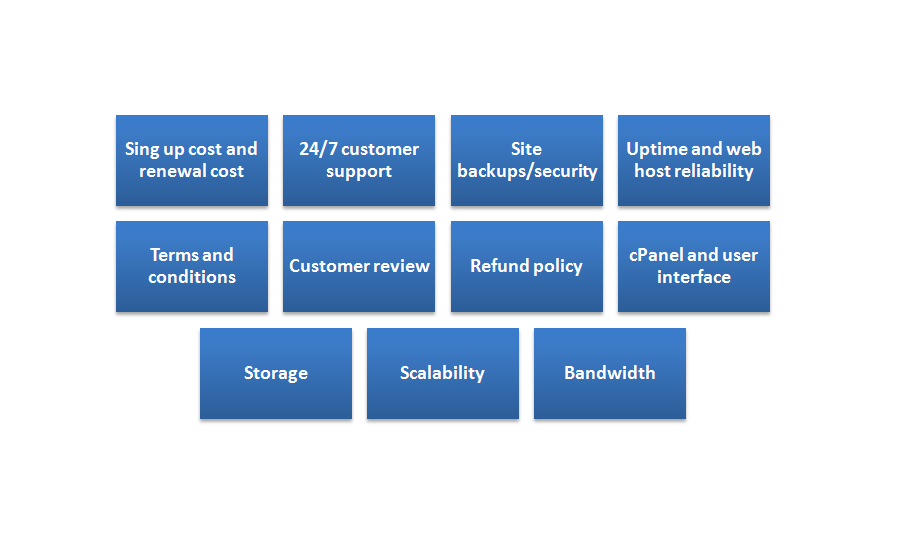
# Sing up cost and renewal cost
When you go for shopping a web host, most probably you’ll first look at the price of the web hosting plan, and at the same time, you’ll want an affordable provider that offers you full reliability. When you check its price make sure what will be a signup cost and renewal cost.
Most of the time, we consider its price that web hosting company is offering us a reliable plan at a discount but we never consider its renewal cost, this is where we get into trouble. So, make sure that you have checked its signup cost as well as renewal cost. Because many companies offer a discount on first time purchasing and when your plan is near to finish, then they charge double for renewal. This is not a fraud, actually at the renewal time they charge original fees.
# 24/7 customer support
Being a fresher or beginner in this field, you would face some technical issues, and at that time, if your web host offers you 24/7 customer support, then it can be very beneficial for you. So, make sure that the web host you are choosing offers you 24/7 customer support. Whenever you want any support related to your hosting, the support team should be available to resolve your issues or queries in a short time by offering you the best possible solution.
# Site backups/security
When you are hosting your website, it is possible that you may face the risk of website crash or inaccessible to your users. Website crash can occur due to cyber-crime, or there might be any other reasons also. So ensure that your web host offers you site backup so that if the website crashes, then you can restore your website again.
Sometimes, website crashes when you don’t have enough technical knowledge, and you make changes in code, and unintentionally you delete or add code with errors, and then you are unable to remove those errors.
Web hosting providers also face online threats that can harm their services, thus regular site backups are important by hosting providers and at your end too. Regular site backups will ensure you that your website data is safe and it contains multiple copies of your website data so that if anything misshapen you can retrieve your data at any time.
# Uptime and web host reliability
The most important thing you need to consider is uptime and web server’s reliability. Make sure your web host offers you a higher uptime guarantee, and if your web host offers you a 99.99% uptime guarantee with minimum downtime, then this is the best thing about web host. Another important thing is to ensure that your web host is offering you at least 99% uptime, below 99% uptime is not reliable, and it is not acceptable for web hosting.
Make sure your web host offers you 24/7 customer support and reliability. Being a website owner, you never want your website to have unexpected downtime, even for a very small period of time. So, it is very important to have hosting providers which are operating on a powerful server and having good hardware and stable network connection.
# Terms and conditions
In a busy lifestyle, no one has time to read a full document, and usually what we do, we click on the Agree button when it’s time to read terms and conditions. Maybe some people read all terms and conditions offered by any web hosting companies, but mostly we avoid reading.
It is very important to read all terms and conditions before going for any web hosting plan. If you have any query, then ask so that they wouldn’t land you in trouble if you breach rules or service cancellation fees.
# Customer review
Customers always leave a review and rating about the company as per the experience they had with the web hosting company. You can make the right choice by finding many online reviews about the hosting providers. You can even see the rating given by the customers.
# Refund policy
Most of the best hosting companies offer a trial period or refund policy during which you can experience the services offered by them, and you can decide whether you want to continue with their services or want to quit. But with this, make sure before the trial period ends you cancel your account because if you forget to cancel your account then maybe they will be charged for the whole trial period.
When you use web hosting service and want to stop the service, and you want to move to another service provider in the case when you are not satisfied with the services, then you can ask for refund and cancellation of service.
# cPanel and user interface
All hosting companies provide cPanel Plesk to manage your hosting. It is a very basic requirement for website owners but it is important to check whether your host offers you cPanel for free or charge for it because many companies offer it for free.
# Storage
Various web hosting companies offer “unlimited storage” but that comes with restrictions. If you have a small website or you have just started, then you can go for shared hosting plan because the first thing, it is cheap and it can meet your basic requirements.
# Scalability
Scalability helps your website to manage huge spikes in visitor numbers, and when you need more resources then your host offers scalability that will allow your website to grow more.
Ensure that your web host offers you room to grow which means when you want to upgrade your existing plan, and then they allow you to do it. For example, as a beginner, you choose shared hosting plan but when you find that your website is getting a huge number of visitors on your website then on that time you’ll need to upgrade your plan to VPS or dedicated or any other which can manage high-volume of website traffic.
# Bandwidth
Bandwidth can be described as the amount and type of data that can be transferred between your website, the users, and the Internet. Each web hosting provider offers a different level of bandwidth. The level of bandwidth can help you to know which hosting provider has the best network, system, and connection.
If your website is small and having 5000 or fewer website users per month, then you don’t need to worry about bandwidth. Best companies offer all the bandwidth you need on their cheapest hosting account.
Should you purchase domain and web hosting from the same company or not?

Web hosting has two essential parts such as domain name registration and website hosting. At the same time, both a domain and web hosting are required for the website. Although mostly every web hosting service providers offer both services, some companies offer separate domain and web hosting services. So, you can go for both directions, therefore, here we are going to tell you what will be the benefit for you if you separately choose both services or if you choose both services from the same host.
If you are a beginner then you may find different websites or forums give you different advice on domain registration and website hosting. Some users will suggest you buy a domain from the same company where your website is hosted. On the other hand, some will suggest you separate your domain from the website hosting provider. Maybe you are getting confused with all this stuff, but here we will explain both aspects which will help you to understand “what you should choose?” let’s get started!
# Why you should keep your domain name and web hosting together?
According to some website owners, users should keep their domain name and web hosting under one roof. There are various reasons why most users want to keep their domain registration and web hosting together:
- One account
When we have to manage lots of accounts, then it can make confusion that mostly we forget to renew or any important notification can be missed out. Having a single account will be easy to manage, this is the main and important reason why people want to keep their website hosting and domain registration under one roof. As you can manage everything under one account and you can avoid hassle and save your time directing your domain to the webserver.
- Affordable
Most of the users choose a domain name from the same company where their website is hosted on because they can have a free domain name for their website for one year when they choose their first plan with any company. This offer can vary from one host to another, as some hosts offer free domain registration for one year when a new customer arrives and buy a hosting plan and maybe some hosting providers offer domain registration at a lower cost.
# Why you should keep your domain name and web hosting separately?

Some website owners suggest that you should keep your domain name and web hosting separately. Before getting into detail, first, you should know what is domain registration is?
Well! Domain registration does redirection work- as it directs people to the files of a specific website via an Internet browser. For example, .com, .org, .net and many more, these are some domain names.
When we combine domain name and web hosting, then it can be defined as “the domain name of a website specifies the internet address and hosting is the place where your website is built on.”
Now, we will consider some important reasons why you should keep your domain name and web hosting separate:
- Easy to switch web hosting service providers
If you have fewer commitments with hosting companies, then it will be easy for you to switch web hosting providers. For example, suppose you are experiencing unexpected downtime from your current hosting provider, they offer you less technical support, you are paying too much for renewal, or facing other issues, and then you can easily change your host without impacting your domain name. For this, all you need to do is move the files to the new host and redirect the DNS settings.
- Protect your domain name
If your hosting provider doesn’t offer you two-factor authentication, then it can be easier for hackers to access your website, and if your domain is also registered with the same hosting provider, then you will lose your domain too. Hackers can transfer your domain name somewhere else. As a result, you will lose your website users as well as money. If your domain name and web hosting service expire on the same date, then also you’ll lose your domain name.
- Separate accounts
Some companies are specialized in domain registration, and some are specialized in web hosting. It is quite hard to find a company which is specialized in both web hosting and domain registration.
The company that is specialized in domain registration will offer you privacy, sub-accounts, advanced DNS settings, and other advantages. The company that is best in web hosting services will offer you great file management, site-lock features, site backups, and many more features. It will be good and easy to have separate accounts for both domain registration and web hosting to get best service experience.
- More top-level domains options
When you register a domain with the same host where you have hosted your website, then maybe you’ll get a few domain variations. Maybe you want a unique domain name based on a niche market. Therefore, if you use a dedicated domain provider, then you’ll find more variations of domains.
Which method is better: Hosted website or Self-Hosted Websites?
Before getting into detail, first, you should understand what exactly hosted website and self-hosted websites are?
To define a hosted website, let’s take an example, a hosted website is like you don’t have your own house but you pay rent to the owner of the house. You can use all resources but in the limit, but can’t own the land. In simple terms, your website will be hosted on a server that you don’t have any access to, i.e. you can’t directly access the servers.
On the other hand, self-hosted websites are like owning a house. Every part of the house will belong to you, similarly, every resource such as storage, bandwidth, or other resources will belong to you. You can customize it, you can do it yourself, or you can pay someone to do it for you.
# Difference between a hosted website and self-hosted website
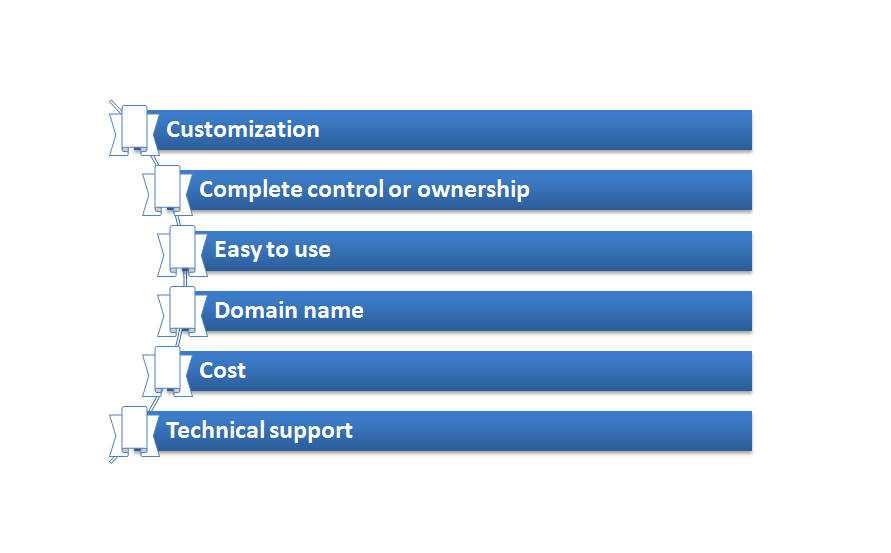
- Customization
The self-hosted website has an important feature of customization, as you can customize your self-hosted website accordingly. When your business will grow you need to incorporate some new features to expand your website, so a self-hosted website has the ability to do it. On the other hand, if your website is on a hosted server, then making changes or adding new features into it will be limited and difficult for you as compared to a self-hosted website.
- Complete control or ownership
When you go for a hosted website, then you don’t have access to your content, and you can’t own the code. Suppose your hosting provider wants to change its rules, you would get into trouble, it might be possible you can’t take a backup of your site. As opposed to this, if you are self-hosting your website, you are the one who owns the code, has complete access to your content.
- Easy to use
This is one point which is in the favor of hosted website, basically, in a hosted website, everything is pre-designed and pre-built, and you just need to do is sign up and use all its services. In self-hosted websites, you have to write code, maintain the load of the server, databases, packages and manage other backend things.
- Domain name
With the self-hosted website, you can choose a domain name for your website according to your requirements, instead of using the hosting company’s domain. In a hosted website, you have to use the company’s URL, and with the separate domain, the implementation of complex SSL will be included.
- Cost
The self-hosted website is expensive as compared to a hosted website. As it needs lots of investment to set up and launch it, but in the long run, it will give you various benefits, as you can incorporate and integrate various features you need without paying for unnecessary additional features. In a hosted website, you might require a particular feature or plugin for your website.
- Technical support
With a hosted website, you’ll find that the hosting company offers you 24/7 customer support when you are having any technical issues or related to your hosting. They will be responsible for find errors and determine the solution. On the other hand, in the self-hosted website, you have to find and solve errors on your own.
All of the above points will help you to decide which is better and we hope you’ll go with that hosting which will be suitable for your business or website. Make sure to consider all points before making any decision. If you have high-technical knowledge and a high budget, then opting for a self-hosted website is not going to be a wrong decision. And, if you want to rely on another hosting company, then you should go for a hosted website. Both have pros and cons, but you can choose any one of them as per your requirements.
How to host a website: Follow simple steps

If you are building a website and want every person to visit your website on the Internet and share your services with others, then first you need to host your website. If you don’t know how to do it, then here we are going to make it easy for you by defining each and every step.
Hosting a website means, your website will be stored on a server. You can choose a hosting provider who will be responsible to maintain the server and technology required to connect your website to the Internet so that anyone can visit your site.
When an internet user wants to visit your site, they will simply enter your domain or web address into their web browser. Their device will connect to the server where your website is hosted on, and the server, in turn, will deliver the requested page to the user. This is how simple it is.
Hosting a website is an easy process, but you should ensure that you have chosen the right web host because one wrong decision can cause a big problem. Now the question arises “how to host a website?”
You’ll find a huge amount of information on the internet about web hosting. But, how satisfied you are from their information will depend on your technical experience, type and size of your website etc.
If you have little technical knowledge, obviously you’ll have after all you are developing a website for your business. So, here we’ll describe each step, how to host your website with ease.
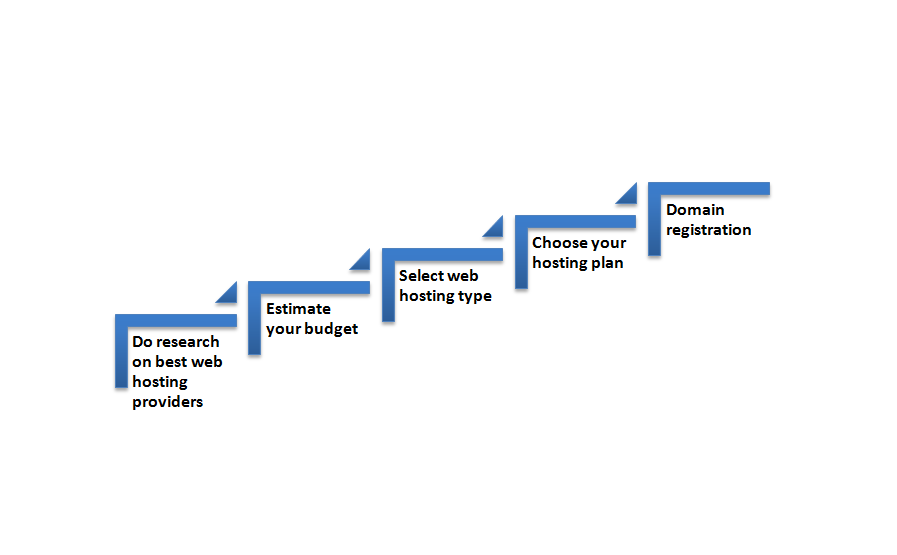
# Do research on best web hosting providers
Web hosting is much like shopping for products or services. Consider an example, before you make any purchase you do research on that particular product so that you’ll aware of what are the benefits and demerits of that product. In the same manner, you should do research on the best web hosting providers, you can view their rating and feedback given by the customers so that you’ll have an idea about that web hosting company.
As you know there are plenty of web hosting services providers available in the market so before making any decision on it, do research and compare all plans offered by one company with other web hosts, it will help you to narrow your search.
You’ll notice that there are various web hosting providers who offer high speed, some companies give priority to customer support. Some providers deal with small websites while others deal with large websites.
So, which company is best suited for you?
To make it easy for you, various experts can help you to suggest some popular web hosting providers. So without wasting your time, you can get an idea from those experts. In this article, we will also list some best web hosting providers.
# Estimate your budget
The second most important thing is to determine your budget because if any web hosting company offers you an expensive plan maybe you’ll unable to buy it. So before making any purchase compare price with other web hosting provider’s plans, then decide which is best for you or which meet your requirements?
# Select web hosting type
In this step, you should need to choose a hosting plan. Your host will offer you a different type of web hosting. As we have mentioned above the different types of web hosting and best suited for. You can take help from that concept to know which hosting type will be best for you.
# Choose your hosting plan
After selecting your hosting type, it is necessary to consider important things about web hosting such as uptime, performance, resources, customer support, renewal rates, storage and bandwidth, etc.
# Domain registration
A domain name helps users to identify your website uniquely. So, it is important to have a domain with your website. Some hosting providers offer the free domain name for one year if you’re their new customer and you have purchased their plan first time, but you have to pay on its renewal time.
Best web hosting providers in India
The following are the best web hosting providers in India, you can view their website to host your website with them:
# Hostinger

Hostinger offers various types of web hosting services including shared web hosting, cloud hosting, VPS hosting, domain registration, etc. It offers web hosting services from beginner to large enterprises. It offers fast and secure web hosting at reasonable prices. It also offers 24/7 customer support that is very responsive and impressive. You can view their price and plans and also can compare with others.
# HostGator
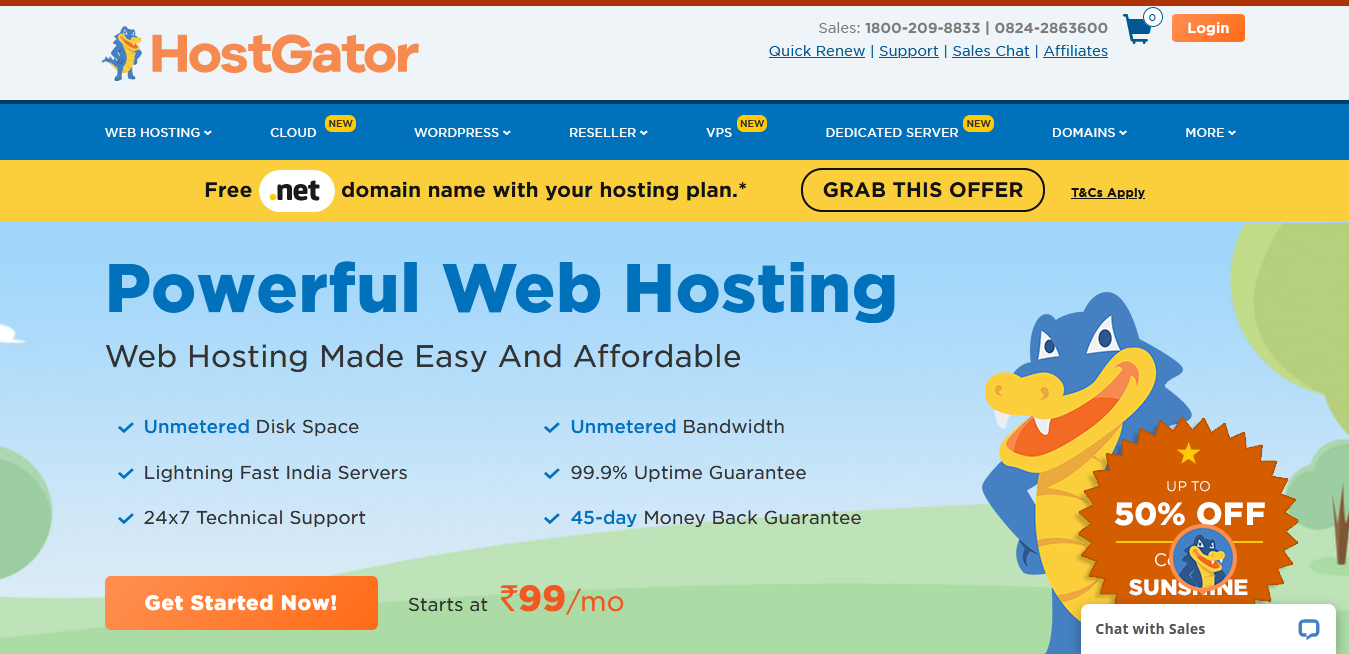
If you host your website with HostGator you’ll get a professional-looking, impressive and functional website as well as a user-friendly website. HostGator offers unlimited space and bandwidth with its plans at an affordable cost. It offers shared hosting, reseller, dedicated server, VPS, WordPress and cloud hosting, etc. It also offers 99.9% uptime, fast loading time, and 24/7 customer support, etc.
# PetalHost
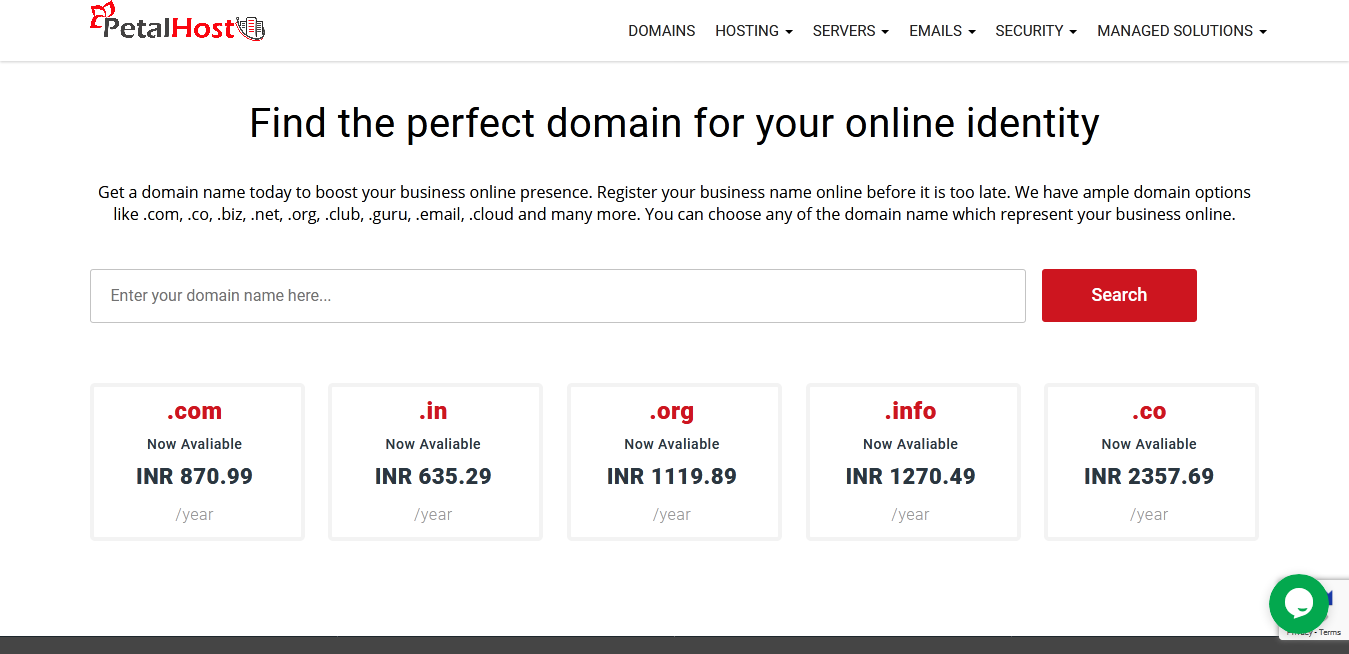
PetalHost is responsible to offer fast loading time, 99.9% uptime, and many more features with their hosting plans to its customers with full reliability. It serves from small websites to large websites by offering services at reasonable prices. Their packages include basic shared hosting, unlimited Linux hosting, Linux reseller hosting, manage WordPress hosting and many more services.
# A2 hosting
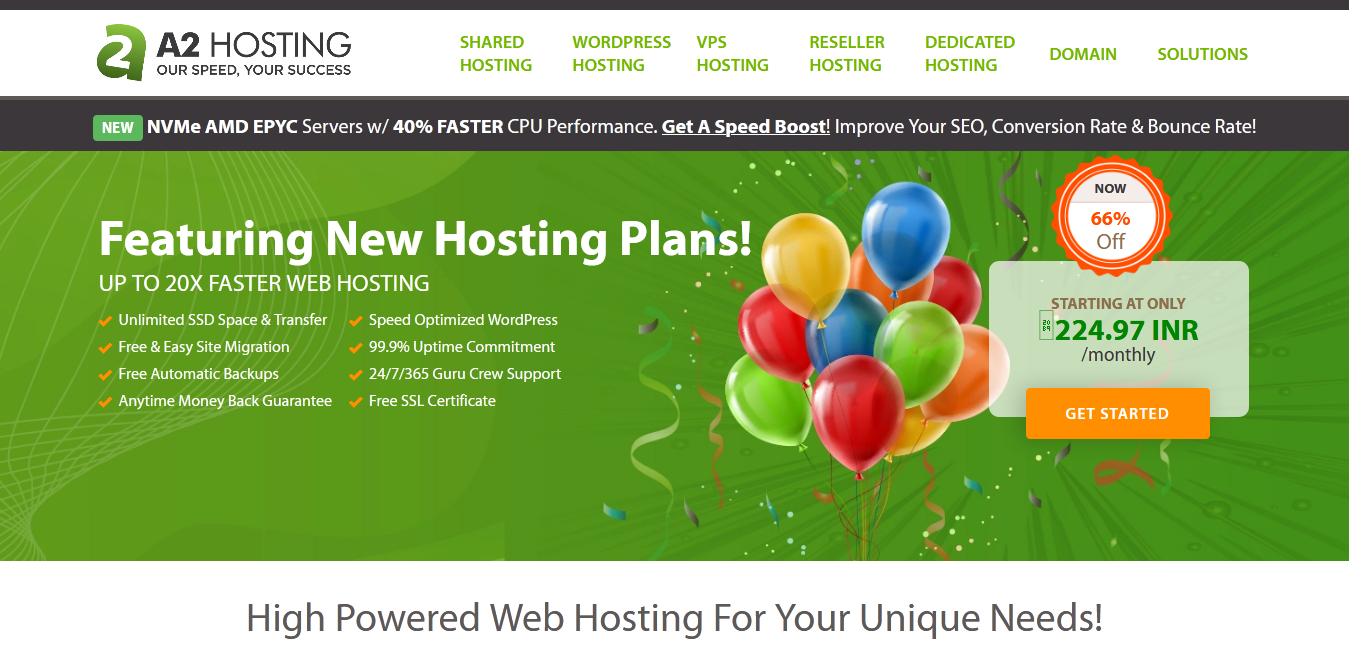
A2 Hosting has been around since 2001 and they have a good reputation among users. With A2 hosting it is guaranteed that you’ll have fast speed, 24/7 customer support and you can communicate with their customer support team via email, live chat and phone call if you have any technical or non-technical issue with your hosting.
# SiteGround
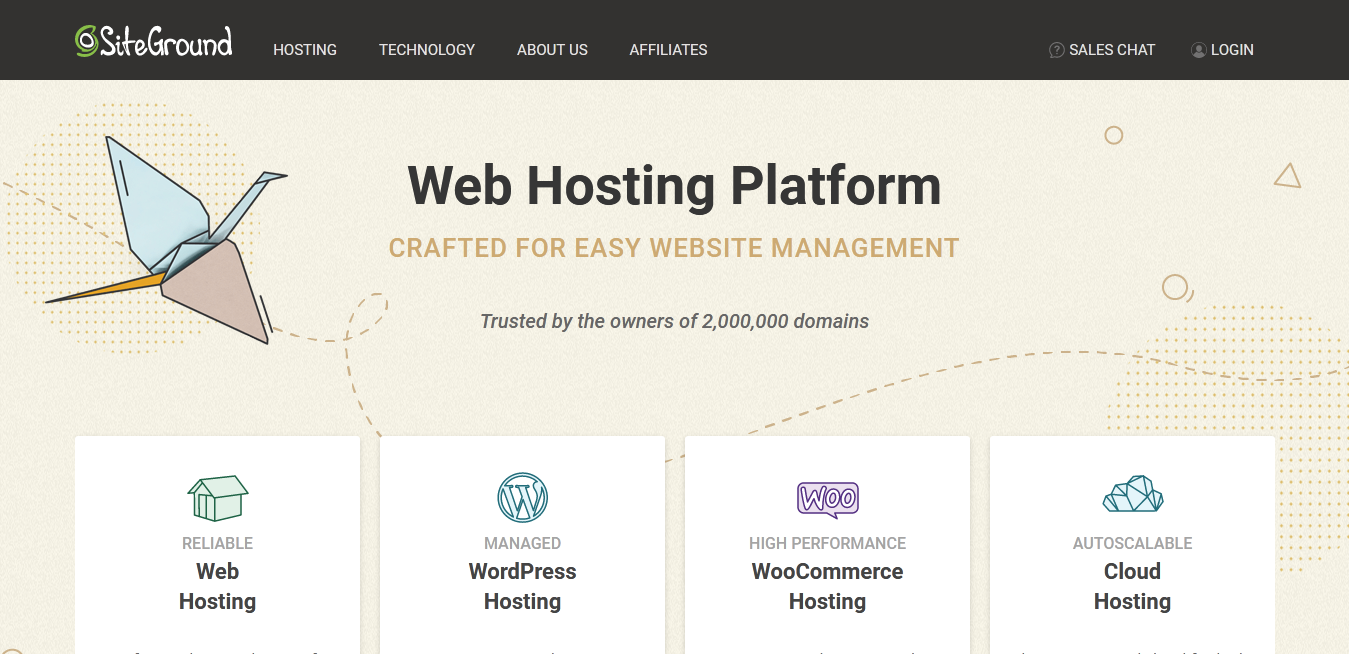
SiteGround hosts over a million websites across the world and its packages include shared WordPress, cloud, and dedicated hosting. Their customer support team is available 24/7 in your service, offers fast speed, and many more features are offered by SiteGround.







